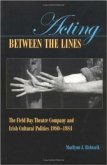New laws enacted in the wake of Hitler's ascent to power removed all Jews from their professional workplaces and banned Jewish artists from any collaboration with their fellow citizens. In the summer of 1933, Goebbels's Prussian Theatre Commission approved an all-Jewish theatre as part of the Kulturbund Deutscher Juden, the Cultural Association of German Jewry. This network of Jewish cultural leagues and theatre ensembles across Germany coexisted with Nazi policies against Jews until the Gestapo dissolved the theatre in 1941. Revealing the complex interplay between history and human lives under conditions of duress, Rebecca Rovit focuses on the eight-year odyssey of the Berlin Kulturbund and its theatre.
Hinweis: Dieser Artikel kann nur an eine deutsche Lieferadresse ausgeliefert werden.
Hinweis: Dieser Artikel kann nur an eine deutsche Lieferadresse ausgeliefert werden.








